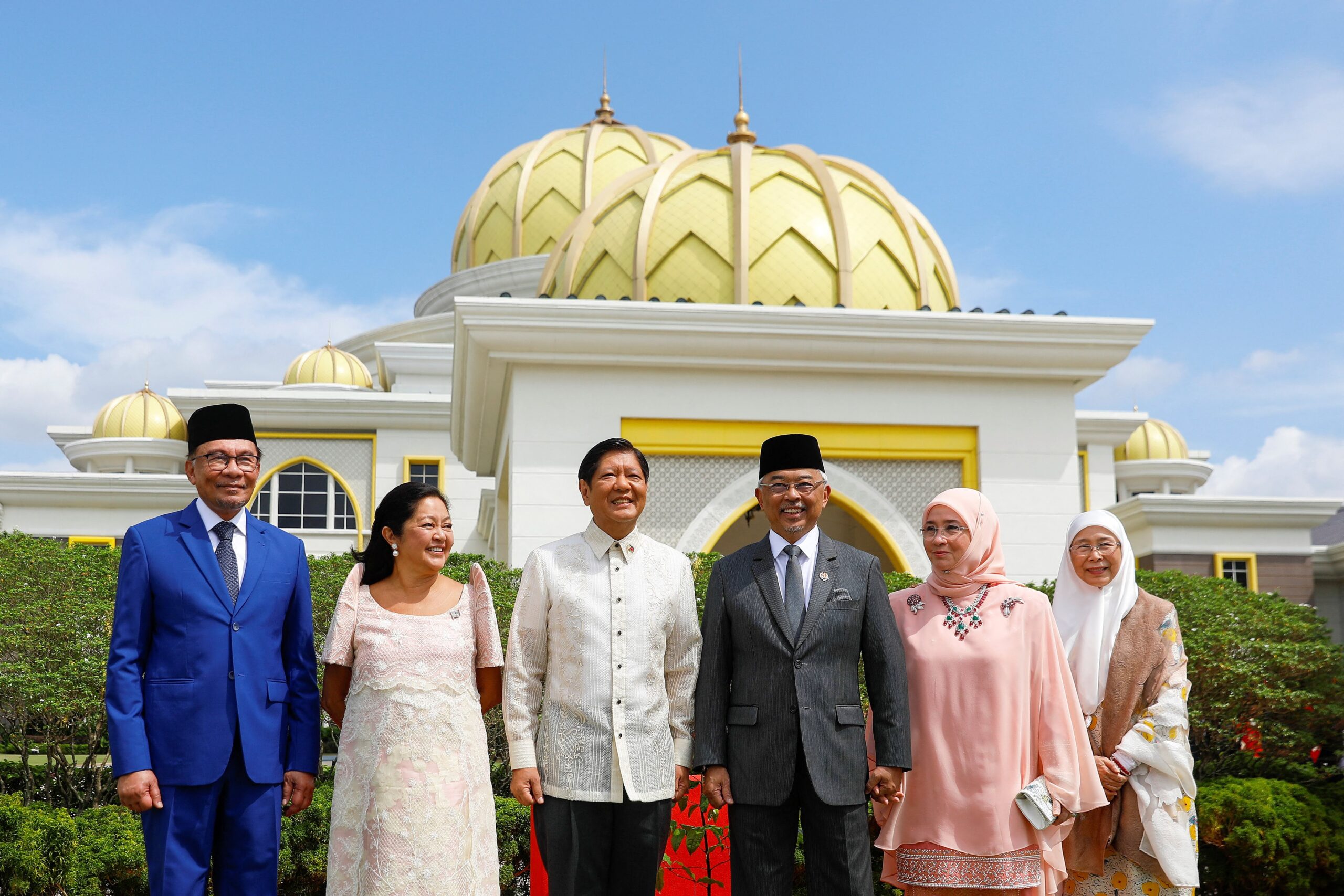
President Ferdinand Marcos Jr. stands with Sultan Abdullah of Malaysia outside the royal Istana Negara along with (from left) Prime Minister Anwar Ibrahim, first lady Liza Marcos, Queen Azizah Aminah and Anwar’s physician-wife Wan Azizah. —REUTERS
MANILA, Philippines — President Ferdinand Marcos Jr. said the Philippines’ claim to Sabah — a huge island south of the country and east of Malaysia — was briefly mentioned when the leaders of the two countries met.
Marcos, when he was asked about the Sabah issue before returning to the Philippines on Thursday, initially said that the topic was not discussed in his meetings with Malaysian leaders during his three-day state visit there.
However, he then admitted that it was mentioned, but both countries agreed to focus more on the things they have in common rather than their differences.
“Hindi. (Pero) well nababanggit, lagi namang nababanggit ‘yon eh, hindi mo maiwasan, meron naman talaga tayong outstanding claim, hindi natin binabawi, but what we […] I mean it’s clear to every, all the parties involved na hindi naman ‘yan maide-decide ‘yan ngayon,” Marcos said.
(No. But it was mentioned, it has been mentioned repeatedly, you cannot avoid that since we really have an outstanding claim, which we do not recant. But what we […] I mean it’s clear to every… all the parties involved that it would not be decided in an instant.)
“Kung mag-uusap (If we would talk) we’ll have to do something much, much larger and much more involved than just a quick discussion of five, 10, 15-minute discussions with the leaders. So it was, the consensus is just we talk about everything else,” he added.
Marcos explained that the two countries chose to discuss issues that they can have a quick conclusion about, rather than a dispute which will not be resolved in the near future.
“We talked about trade, we talked about the help that Malaysia has been providing, the development of the BARMM. We talked about the, again, the people-to-people side of our relationship. But always, I mean, it is something that we, neither the Philippines nor the Malaysia is withdrawing,” the President said.
“But we still find a modus vivendi so that we can work with each other without coming into conflict over just one single issue. It is as usual when it comes to these diplomatic issues, is that it’s up to us to define what our relationship is, and I think we have agreed that there’s a tacit agreement at the very least that we do not, that we talk about all the things that are solvable, all the issues that we can actually do,” he added.
Past administrations have been adamant that Sabah, which is currently under Malaysia’s jurisdiction, belongs to the Philippines. During the term of Marcos’ predecessor, former president Rodrigo Duterte, presidential spokesperson Harry Roque said that Sabah was given to the Sultanate of Sulu as a gift.
And since the Sultanate of Sulu was integrated into the Philippine government and territory, Sabah is a part of the Philippines.
Roque was confident back then that the dispute would not affect Malaysia and the Philippines’ strong ties.
READ: How Malaysia ended up owing $15 billion to Sulu sultan’s heirs
READ: Heirs of Sultan of Sulu pursue Sabah claim on their own
Even President Marcos’ father, his namesake and late former president Ferdinand Marcos Sr., tried to pursue the Sabah claim. Although officials from the older Marcos’ administration have denied controversies, opposition figures believe that the former president tried to organize a paramilitary squad to take Sabah by force.
Marcos’ defense minister — and now Presidential Legal Counsel Juan Ponce Enrile maintained in 2018 that the so-called Jabidah massacre where the 27 Moro youths recruited by the military for a covert operation in Sabah were supposedly killed, is a work of fiction.
The denial by Enrile sparked controversy as Moro leaders in Mindanao maintained that they will never forget the incident, which gave birth to separatist movements including that led by Moro National Liberation Front founding chair Nur Misuari.
READ: ‘Massacres during Marcos regime gave birth to Moro resistance’